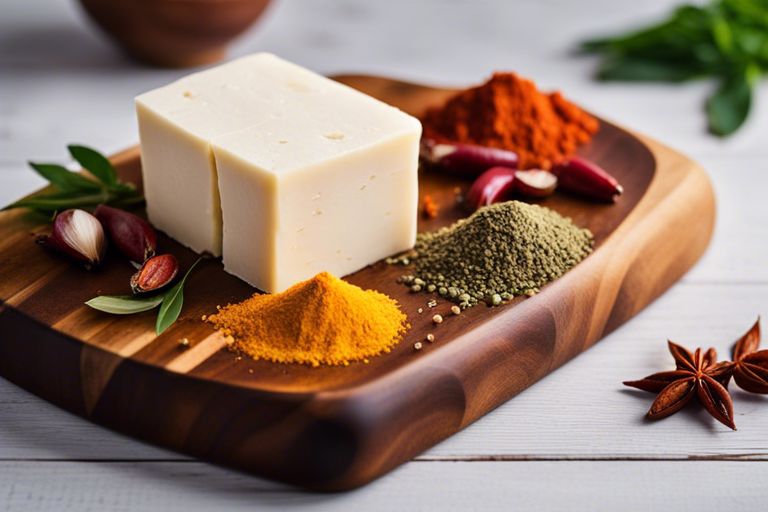Over, you may be curious about whether paneer is high in protein. Let’s investigate into this creamy Indian cottage cheese and uncover its protein content. Paneer, although a dairy product, is indeed a rich source of protein. In this article, we will explore just how protein-packed paneer really is and why it can be a beneficial addition to your diet.
Key Takeaways:
- Paneer is a good source of protein: Paneer is a fresh cheese that is high in protein, making it a good option for those looking to increase their protein intake.
- Protein content in paneer: Paneer contains about 18 grams of protein per 100 grams, which is relatively high compared to other dairy products.
- Benefits of consuming high-protein paneer: Including paneer in your diet can help in muscle building, weight management, and overall health and wellbeing.

Nutritional Profile of Paneer
The nutritional profile of paneer is necessary to understand why it is often considered a valuable addition to your diet. Let’s examine into the details of the protein content and other necessary nutrients found in paneer.
Protein Content
An important aspect of paneer is its protein content. Paneer is a rich source of protein, making it a popular choice for vegetarians and those looking to increase their protein intake. Protein is crucial for various functions in your body, such as building and repairing tissues, supporting immune function, and providing energy.
Other Essential Nutrients
Aside from protein, paneer also contains a variety of other necessary nutrients that are beneficial for your overall health. These nutrients include calcium, phosphorus, selenium, vitamin B12, and riboflavin. Calcium is necessary for maintaining strong bones and teeth, while vitamin B12 is important for the formation of red blood cells and neurological function.
Content: Including paneer in your diet can help you meet your daily protein requirements and provide you with necessary nutrients that support your overall health and well-being. Consider incorporating paneer into your meals as a nutritious and versatile ingredient.

Comparison with Other Dairy Products
Milk and Whey
With paneer being a popular dairy product, you might wonder how it compares to other dairy options like milk and whey. Let’s break down the protein content in a simple comparison:
| Dairy Product | Protein Content per 100g |
| Milk | 3.2g |
| Whey | 11g |
Cheese and Yogurt
On the other hand, when comparing paneer to cheese and yogurt, here’s what you need to know:
| Dairy Product | Protein Content per 100g |
| Cheese | 18g |
| Yogurt | 5g |
Understanding the protein content in different dairy products can help you make informed choices when planning your meals. While paneer is a good source of protein, cheese stands out as having a higher protein content per 100g.
Factors Affecting Protein Content in Paneer
All factors affecting the protein content in paneer need to be considered to understand its nutritional value fully. Here are some key factors to keep in mind:
- Milk Source – The type of milk used in making paneer can significantly impact its protein content. The protein content in paneer made from whole milk will be higher compared to paneer made from low-fat or skim milk. If you want the most protein in your paneer, choose paneer made from whole milk.
- Manufacturing Process – The way paneer is made can also affect its protein content. The more concentrated the milk is before curdling, the higher the protein content in the final paneer product.
Recognizing the role these factors play can help you make informed decisions about the paneer you consume. For more information on the protein content in paneer, check out How much protein is in paneer.
Type of Milk Used
Milk source is crucial when it comes to the protein content in paneer. The type of milk used directly impacts the protein levels in the final product. Whole milk contains more fat and protein, resulting in higher protein content in paneer made from it. On the other hand, low-fat or skim milk will yield paneer with lower protein content.
Manufacturing Process
Used in paneer making directly impacts its protein content. The process of curdling and straining milk to separate the curds results in varying protein levels in paneer. If the milk is more concentrated before curdling, the protein content in the final paneer will be higher. Therefore, the manufacturing process plays a significant role in determining the protein content of paneer.
Factors Affecting Protein Content in Paneer
Health Benefits of High-Protein Paneer
Once again, paneer proves to be a versatile ingredient that offers numerous health benefits, especially when it comes to being a rich source of protein. Protein is important for various functions in your body, including muscle growth and repair.
Muscle Growth and Repair
Muscle maintenance and growth are crucial for overall health and well-being. Paneer, being high in protein, can help support these processes in your body. When you consume paneer regularly, you provide your muscles with the necessary amino acids to repair and grow stronger after workouts or daily activities.
Weight Management
Health experts often recommend including protein-rich foods in your diet to aid in weight management. Paneer can be a great addition to your meals as it helps you feel full and satisfied for longer periods. This can reduce your overall calorie intake and prevent overeating, ultimately supporting your weight management goals.
Additionally, protein has a high thermic effect, meaning your body burns more calories to digest protein compared to fats or carbohydrates. By incorporating paneer into your meals, you can potentially boost your metabolism and support your weight loss efforts.
Incorporating Paneer into a High-Protein Diet
Now, if you are looking to boost your protein intake by incorporating paneer into your diet, there are various ways you can do so. According to a study published in Paneer—An Indian soft cheese variant: a review – PMC, paneer is a rich source of protein, making it a great addition to your meals.
Recipes and Meal Ideas
Any paneer lovers can enjoy this versatile ingredient in a variety of dishes. Try adding paneer to salads, stir-fries, curries, or even grilled as a delicious topping for your favorite dishes. Paneer can also be crumbled and used as a filling for wraps or sandwiches, providing a protein-packed alternative to your usual choices.
Combining with Other Protein Sources
The key to creating a balanced high-protein meal is to combine paneer with other protein sources. By pairing paneer with foods like lentils, chickpeas, tofu, or nuts, you can create a complete amino acid profile that will benefit your body. The combination of different protein sources ensures that you are getting a variety of nutrients and amino acids vital for muscle recovery and overall health.
Understanding the importance of combining paneer with other protein sources can help you maximize the benefits of a high-protein diet. Including a mix of protein-rich foods in your meals ensures that you are meeting all your nutritional needs and supporting your fitness goals.
Debunking Common Myths
Is Paneer Too High in Fat?
After examining the nutritional content of paneer, you might have concerns about its fat content. While it’s true that paneer is a dairy product and does contain fats, not all fats are created equal. Paneer is rich in saturated fats, which, when consumed in moderation, can be a part of a healthy diet. It’s imperative to remember that fats are necessary for various bodily functions and can help keep you feeling full and satisfied.
Does Paneer Contain Hormones?
An important myth to address is the concern that paneer contains hormones. Myths about hormones in dairy products have circulated, leading to confusion about their safety for consumption. Rest assured, paneer does not contain added hormones. The hormones naturally found in dairy products are not a cause for concern and are present in safe levels that do not pose a risk to your health.
To clarify, dairy animals, including cows that produce milk for paneer, may be given hormones to improve production efficiency. However, strict regulations and testing ensure that the milk and dairy products, such as paneer, that reach your table are safe for consumption. When choosing a quality paneer product, look for trusted sources and organic options to further alleviate any concerns about hormones.
To wrap up
Considering all points discussed in the article, it is clear that paneer is indeed high in protein and can be a great addition to your diet if you are looking to increase your protein intake. However, it is important to remember that moderation is key, as paneer is also high in fat and calories. Incorporating paneer into your meals in a balanced way can provide you with a healthy dose of protein along with other necessary nutrients.
FAQ
Q: Is paneer high in protein?
A: Yes, paneer is considered to be a good source of protein. It is a dairy product that contains high levels of protein, making it a popular choice for vegetarians and those looking to increase their protein intake.
Q: How much protein does paneer contain?
A: Paneer is a rich source of protein, with approximately 18 grams of protein per 100 grams serving. This makes it a valuable addition to a balanced diet, especially for individuals looking to meet their daily protein requirements.
Q: Are there any other nutritional benefits to consuming paneer?
A: In addition to being high in protein, paneer also provides imperative nutrients such as calcium, phosphorus, and Vitamin D. These nutrients are important for bone health and overall well-being, making paneer a nutritious choice for individuals of all ages.



